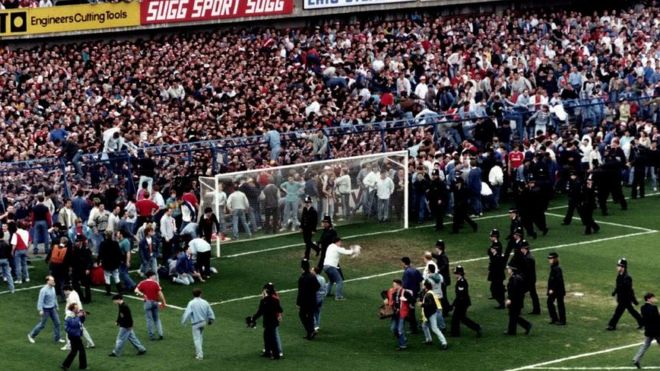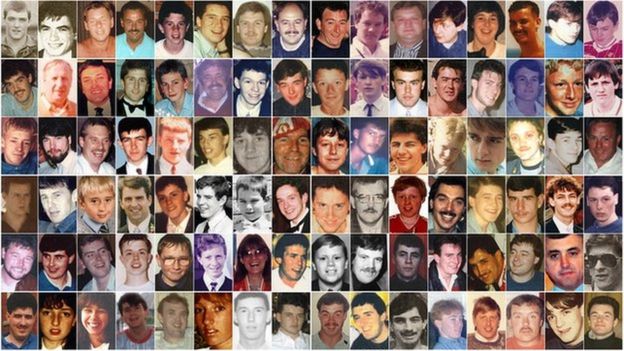
Hillsborough inquests: Jury reaches decision on unlawful killing question
-
Monday April 25 2016
- From the section Liverpool

Jurors have reached a majority decision on whether the 96 victims of the Hillsborough disaster were unlawfully killed.
The jury of six women and three men had been deliberating since 6 April after hearing evidence for two years.
The forewoman said at least seven of the nine jurors had reached agreement on the unlawful killing question in a 14-section questionnaire.
The conclusions will be formally returned at 11:00 BST on Tuesday.
Jurors had already reached unanimous conclusions for 13 of the questions. The remaining question – for which they were given a majority direction– asked whether the 96 were unlawfully killed.
To answer yes, jurors must be “sure” that Ch Supt David Duckenfield, who was in overall command of the police operation, was “responsible for the manslaughter by gross negligence” of those who died.
Who were the 96 victims?
 Image copyrightother
Image copyrightotherRead profiles of all those who died in the disaster
Ninety-six fans died as a result of a crush on the terraces occupied by Liverpool supporters attending the FA Cup semi-final against Nottingham Forest on 15 April 1989.
Jurors had already made their decision about whether fans’ behaviour added to a dangerous situation outside the stadium in Sheffield.
They have also made conclusions about whether police “errors or omissions” caused or contributed to the dangerous situation at the match and the crush on the terraces.
Based on the evidence, the jury had also decided if police and ambulance service responses to the crushing “contributed to the loss of lives”.

Coroner Sir John Goldring said on Monday he would accept a majority decision at the hearing in Warrington, Cheshire.
He began his summing up on 25 January and spoke to the jury for 26 days in total.
The hearings are the longest running inquests in British legal history.
Four steps to unlawful killing conclusion
The coroner has laid out four steps jurors must consider when answering question six. Only if they are sure of each, can they conclude the 96 were unlawfully killed. They are:
- Firstly, that Ch Supt David Duckenfield owed a duty of care to the 96 who died
- Secondly, that he was in breach of that duty of care
- Thirdly, that the breach of Mr Duckenfield’s duty of care caused the deaths
- Finally, the jury must be sure the breach which caused the deaths amounted to “gross negligence”
For the final point to be proved, the jury has to be sure the match commander’s breach in his duty of care was so bad it amounted to a criminal act or omission.
It must also be sure a “reasonably competent and careful” match commander in his position would have foreseen a “serious and obvious risk of death” to the supporters.

